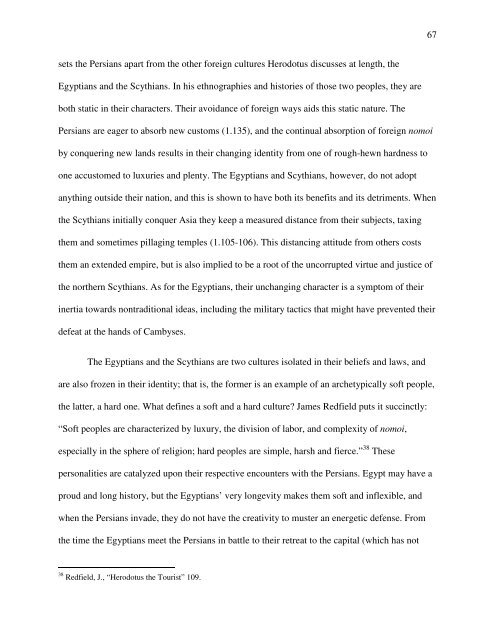The Old and the Restless - The Egyptians and the Scythians in Herodotus' Histories by Robert J. Hagan
You also want an ePaper? Increase the reach of your titles
YUMPU automatically turns print PDFs into web optimized ePapers that Google loves.
67<br />
sets <strong>the</strong> Persians apart from <strong>the</strong> o<strong>the</strong>r foreign cultures Herodotus discusses at length, <strong>the</strong><br />
<strong>Egyptians</strong> <strong>and</strong> <strong>the</strong> <strong>Scythians</strong>. In his ethnographies <strong>and</strong> histories of those two peoples, <strong>the</strong>y are<br />
both static <strong>in</strong> <strong>the</strong>ir characters. <strong>The</strong>ir avoidance of foreign ways aids this static nature. <strong>The</strong><br />
Persians are eager to absorb new customs (1.135), <strong>and</strong> <strong>the</strong> cont<strong>in</strong>ual absorption of foreign nomoi<br />
<strong>by</strong> conquer<strong>in</strong>g new l<strong>and</strong>s results <strong>in</strong> <strong>the</strong>ir chang<strong>in</strong>g identity from one of rough-hewn hardness to<br />
one accustomed to luxuries <strong>and</strong> plenty. <strong>The</strong> <strong>Egyptians</strong> <strong>and</strong> <strong>Scythians</strong>, however, do not adopt<br />
anyth<strong>in</strong>g outside <strong>the</strong>ir nation, <strong>and</strong> this is shown to have both its benefits <strong>and</strong> its detriments. When<br />
<strong>the</strong> <strong>Scythians</strong> <strong>in</strong>itially conquer Asia <strong>the</strong>y keep a measured distance from <strong>the</strong>ir subjects, tax<strong>in</strong>g<br />
<strong>the</strong>m <strong>and</strong> sometimes pillag<strong>in</strong>g temples (1.105-106). This distanc<strong>in</strong>g attitude from o<strong>the</strong>rs costs<br />
<strong>the</strong>m an extended empire, but is also implied to be a root of <strong>the</strong> uncorrupted virtue <strong>and</strong> justice of<br />
<strong>the</strong> nor<strong>the</strong>rn <strong>Scythians</strong>. As for <strong>the</strong> <strong>Egyptians</strong>, <strong>the</strong>ir unchang<strong>in</strong>g character is a symptom of <strong>the</strong>ir<br />
<strong>in</strong>ertia towards nontraditional ideas, <strong>in</strong>clud<strong>in</strong>g <strong>the</strong> military tactics that might have prevented <strong>the</strong>ir<br />
defeat at <strong>the</strong> h<strong>and</strong>s of Cam<strong>by</strong>ses.<br />
<strong>The</strong> <strong>Egyptians</strong> <strong>and</strong> <strong>the</strong> <strong>Scythians</strong> are two cultures isolated <strong>in</strong> <strong>the</strong>ir beliefs <strong>and</strong> laws, <strong>and</strong><br />
are also frozen <strong>in</strong> <strong>the</strong>ir identity; that is, <strong>the</strong> former is an example of an archetypically soft people,<br />
<strong>the</strong> latter, a hard one. What def<strong>in</strong>es a soft <strong>and</strong> a hard culture? James Redfield puts it succ<strong>in</strong>ctly:<br />
“Soft peoples are characterized <strong>by</strong> luxury, <strong>the</strong> division of labor, <strong>and</strong> complexity of nomoi,<br />
especially <strong>in</strong> <strong>the</strong> sphere of religion; hard peoples are simple, harsh <strong>and</strong> fierce.” 38 <strong>The</strong>se<br />
personalities are catalyzed upon <strong>the</strong>ir respective encounters with <strong>the</strong> Persians. Egypt may have a<br />
proud <strong>and</strong> long history, but <strong>the</strong> <strong>Egyptians</strong>’ very longevity makes <strong>the</strong>m soft <strong>and</strong> <strong>in</strong>flexible, <strong>and</strong><br />
when <strong>the</strong> Persians <strong>in</strong>vade, <strong>the</strong>y do not have <strong>the</strong> creativity to muster an energetic defense. From<br />
<strong>the</strong> time <strong>the</strong> <strong>Egyptians</strong> meet <strong>the</strong> Persians <strong>in</strong> battle to <strong>the</strong>ir retreat to <strong>the</strong> capital (which has not<br />
38 Redfield, J., “Herodotus <strong>the</strong> Tourist” 109.
















